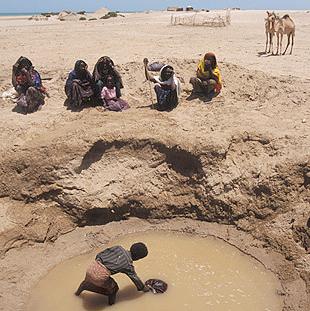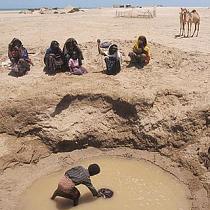Quench your thirst with Oil says Jordan
Watch the video below concerning Jordan's water shortage. Yes, Jordan pursue Oil over water that is vital to human quality-of-survival.
AMMAN, Jordan—In March of 2011, The Hashemite Kingdom of Jordan jumped headlong into unconventional oil extraction, and signed a deal with Karak International Oil (KIO), a subsidiary of Jordan Energy and Mining Limited (JEML--a British company), for the commercial mining of oil shale approximately one hour’s drive from the capital of Amman. Unlike most countries in the region, if you fill up your gas tank in Jordan, you are using imported oil— but the Kingdom is touting a future when extreme extraction will change that, and soon.
Jordan is one of the countries most likely to bear the harshest impacts of climate change, and least suited to dive headlong into the most destructive forms of energy yet devised. Walking the streets of Amman, however, one gets the sense that the government has already decided the country will serve as a launching pad for American interests. The entire city is oriented towards the American troops, engineers, and others who stop off on their way to and from Baghdad, Iraq.
The invasion of Iraq transformed Jordan without the dropping of a single bomb overhead. New oil shale proposals could promote a similarly intense kind of change with an absence of popular input—but perhaps even more discreetly.
The main oil shale deposit designated for exploitation in Jordan is at Al Lajjun in the southern Karak governorate, and the lease has a 35-square-kilometer radius. This project is expected to produce commercial crude for refining within five years, maxing out some years after that at 60,000 barrels of mock crude per day. By way of comparison, the entire nation consumes an average of 200,000 barrels per day.
Part of the project’s construction and know-how will be imported into Jordan from the Athabasca region of Canada via Thyssenkrupp Group of Germany. Thyssenkrupp has pledged to build strip mining operations there based on their existing work in Alberta's tar sands mines—the largest existing industrial project in human history.
Elsewhere in the country, Royal Dutch Shell operates under a 100-per-cent-owned subsidiary called Jordan Oil Shale Company (JOSCO). JOSCO also has long-term development plans for oil exploitation in Jordan that are expected to come online no sooner than 2021. Shell/JOSCO have exploration rights to large segments of the country. Shell will also be bringing technology from their operations in Alberta, Canada—including the huge Albian Sands mine.
It's not just Shell and Thyssenkrupp that are coming in with the know-how. So too are Petrobras and TOTAL SA Energy, of Brazil and France respectively. Petrobras has long since operated an oil shale mining and conversion to oil and gas plant. TOTAL has multiple unconventional oil shale and tar sands plays around the world, some operational.
Read more?
Internet site reference: http://www.dominionpaper.ca/articles/4277
Comments
There are 0 comments on this post













